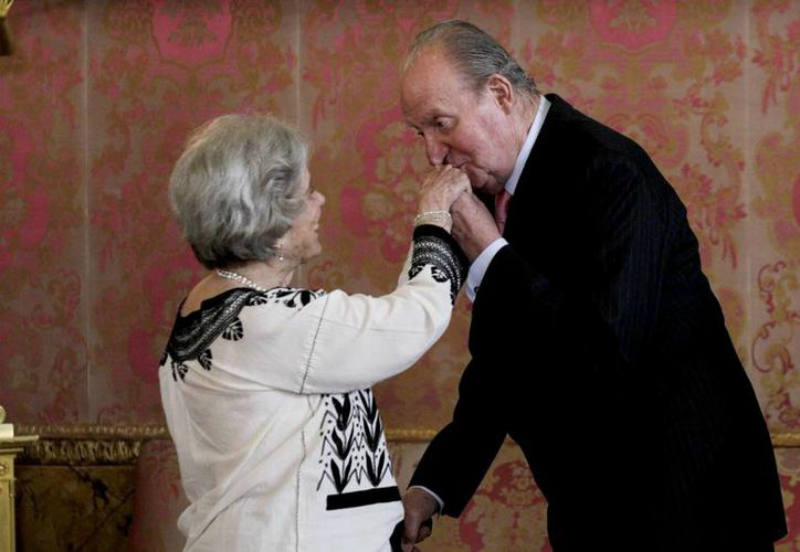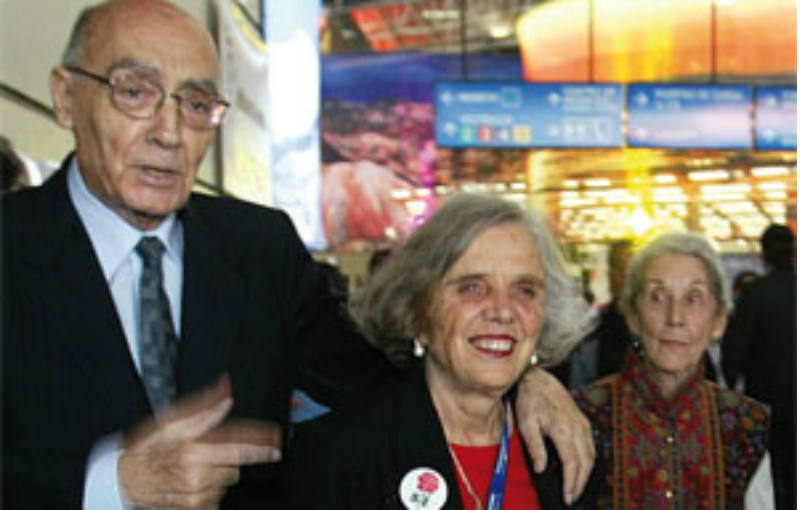Elena Poniatowska no necesita presentación. Es autora de más de cuarenta libros que abarcan casi todos los géneros literarios: entrevista, cuento, drama, crónica, testimonio, novela, ensayo y biografía. No obstante su amplio corpus literario, es más conocida por los géneros que reinventó en México: la entrevista y la novela testimonial. Un ejemplo sobresaliente de esto último es La noche de Tlatelolco (1971) ( Masacre en México , 1975), es un relato colectivo de un trágico enfrentamiento entre estudiantes y militares reflejado en un collage de voces desesperadas que son a la vez el contenido de la obra. y forma Hasta no verte Jesús mío (1969) ( Here’s to You, Jesusa!,2001), una novela neorrealista, es el testimonio de una mujer cascarrabias y admirable que luchó en la Revolución Mexicana y vivió más aventuras que el Periquillo Sarniento ( El loro que pica ) o La Picara Justina ( Justina pícara ).
Aunque Elena ha disfrutado de un enorme éxito como periodista y escritora, siempre ha estado un tanto abandonada por los círculos literarios mexicanos de élite. Como periodista, rastreaba las noticias y, como informaba día y noche, Elena nunca encontraba tiempo para participar en las actividades de la “sociedad de café” literaria mexicana. Además, Elena era muy joven cuando se convenció de que los únicos libros que valía la pena escribir eran los útiles, los libros significativos para su país, lo que llevó a Carlos Fuentes a exclamar: “¡Mira al pobrecito Poni! Allí va en su destartalado VW Bug de camino a entrevistar al jefe del matadero”. Aparentemente, el precio de las cebollas y los tomates, así como las denuncias de desalojos y tomas de tierras, eran mucho más significativos para ella que las ideas, a menudo fugaces, de la vanguardia literaria contemporánea.
Lejos de pertenecer a este mundo que tanto la fascina, Poniatowska desciende del último rey de Polonia, Stanislaus Augusto Poniatowski y del mariscal de Francia, el príncipe Joseph Ciolek Poniatowski. Su familia incluye entre sus ilustres antepasados a un arzobispo, un músico y varios escritores, entre ellos su tía Pita –Guadalupe Amor–, la infame y extraordinaria poetisa que se bautizó a sí misma como “la absoluta Reina del Infierno”. Dado su pedigrí real y sus fuertes inclinaciones izquierdistas, sus parientes europeos, que atesoran su pasado real, apodaron a Elena “La Princesse Rouge”, “La princesa roja”.

Elena Poniatowska nació en París en 1932 y emigró a México cuando tenía diez años, junto con su madre y su hermana Kitzia, las tres huyendo de los peligros de Europa Occidental, que en ese momento estaba en medio de la Segunda Guerra Mundial. Su madre, Paula Amor de Ferreira Yturbe, quien falleció en marzo de 2001 a la edad de noventa y dos años, era una mexicana cuyos antepasados abandonaron México tras la ejecución del emperador Maximiliano y la célebre locura de su amada y manipuladora emperatriz Carlota. Nacida en Francia, doña Paulette conoció a su futuro esposo, el príncipe Jean E. Poniatowski Sperry, durante un baile celebrado en la casa de la familia Rothschild en París, y se casaron poco después, en 1931. La pareja tuvo tres hijos: Elena, Kitzia y Jan, el más joven, que murió en un accidente automovilístico en 1968, cuando solo tenía veintiún años.
Elena comenzó su educación en Francia, donde su abuelo le dio sus primeras lecciones de francés y matemáticas. A su llegada a la Ciudad de México, continuó su educación primaria en la Escuela Windsor patrocinada por los británicos y concluyó su educación formal en el Convento del Sagrado Corazón (Eden Hall) en Torresdale, cerca de Filadelfia. Allí completó “Clases Académicas”: cuatro años de estudios generales además de lecciones de baile, religión y etiqueta. Aunque sus maestros la alentaron a continuar sus estudios en el Manhattanville College, una repentina devaluación de la moneda mexicana dejó a sus padres sin poder financiar su educación universitaria, y Elena regresó a México, una tierra de volcanes y pirámides, haciendas y palacios, pero también de chozas. y huaraches , pulque, yhuitlacoche .
Una vez de regreso en México, Elena estudió taquigrafía y planeó encontrar trabajo como secretaria bilingüe, pero nunca obtuvo una licenciatura. En sus propias palabras, ella “nunca se acercó a una universidad… ni siquiera de noche”, aunque ha recibido varios doctorados honorarios de universidades en México y el extranjero, el más reciente otorgado por la Universidad de Georgetown en 2016. Aunque Elena es la primera en señalar que su educación superior fue menos que convencional. No asistió a la Universidad de La Salle, sino a la Universidad de La Calle (la calle). En cambio, los sujetos de sus entrevistas –incluyendo a Alfonso Reyes, Luis Buñuel, Octavio Paz, Diego Rivera, Juan Rulfo, André Malraux y Rosario Castellanos– se convirtieron en los generosos maestros de una joven siempre curiosa y en ocasiones impertinente.

Conocí a Elena Poniatowska en 1990, hace casi treinta años, cuando impartí una conferencia dedicada a la poesía de Guadalupe Amor. Aunque nos acabábamos de conocer, Elena me invitó de inmediato a su casa en la Ciudad de México, cuando llegué allí varios meses después, me permitió hablar sobre muchas entrevistas que le había realizado a su excéntrica tía “Pita”. Gran parte del material de mi libro La úndecima musa, Guadalupe Amor (1995) fue resultado directo de este primer encuentro en México. En ese momento, rodeado de innumerables álbumes de fotos, álbumes de recortes, recortes de periódicos y otros materiales que daban testimonio de una vida extraordinaria, decidí dedicar mi próximo proyecto biográfico a Elena.
Mi libro tiene un doble propósito. Por un lado, presenta el talento y la personalidad de una de las escritoras vivas más destacadas de México a un público general de habla inglesa, a aquellas personas, por ejemplo, que puedan pensar que Elena Poniatowska —dado su apellido— es una bailarina rusa. Por otro lado, intenté crear un caleidoscopio viviente, un mosaico compuesto por cientos de mosaicos: las voces de su madre, niñera, compañeros escritores, críticos literarios y, lo más importante, ella misma. Es un libro que, al mismo tiempo, rinde un homenaje tácito a Elena Poniatowska a través de su construcción en forma de collage, que creo que es el mejor medio para reflejar, aunque sea fugazmente, los puntos cardinales de su vida y obra. No obstante, y tal vez a imitación del atrevido Faetón,
La carrera literaria de Elena floreció en los años noventa con Tinísima (1992) ( Tinísima, 1996), no solo una biografía novelada de la fotógrafa y militante comunista italiana Tina Modotti, sino también un fresco político y cultural de las primeras décadas del siglo XX en México. y Europa En Modotti, Elena descubrió a un personaje cuya vida y obra cubrió casi toda la gama de temas encontrados en sus libros anteriores: la condición humana, el amor apasionado y la convicción ideológica, además de las vivencias de un extranjero inmerso en los misterios ancestrales de los valientes. nuevo mundo americano, el mismo mundo que Modotti recreó en sus fotografías a veces delicadas, a veces dogmáticas.

Para Elena, esta década fue también un período de reflexión sobre su odisea literaria y periodística de casi medio siglo, y las entrevistas reunidas en ocho volúmenes titulados Todo México (1991-1999) son muestra de esta inclinación, como son sus biografías de dos figuras clave del mundo cultural mexicano que Elena conoció en los años cincuenta cuando los entrevistó por primera vez: Octavio Paz: las palabras del árbol , y Juan Soriano: niño de mil años [Juan Soriano: Niño de mil años], ambos publicados en 1998.
En mi libro, Elena Poniatowska: An Intimate Biography , documento la creciente globalización de su obra literaria, que se considera lectura obligatoria en las universidades de los Estados Unidos, donde muchos de sus libros y ensayos han sido traducidos al inglés y donde cada vez más los investigadores dedican artículos, reseñas y ensayos a los múltiples temas que abarca su voluminosa y heterogénea producción literaria.
El dossier que Latin American Literature Today le dedica a Elena, al que tengo el honor de contribuir, tanto como biógrafa como amiga, no solo agrega una dimensión nueva y significativa a la erudición de su vida y obra, sino que también sirve como un tributo apropiado a una de las figuras más importantes del mundo hispanohablante.




